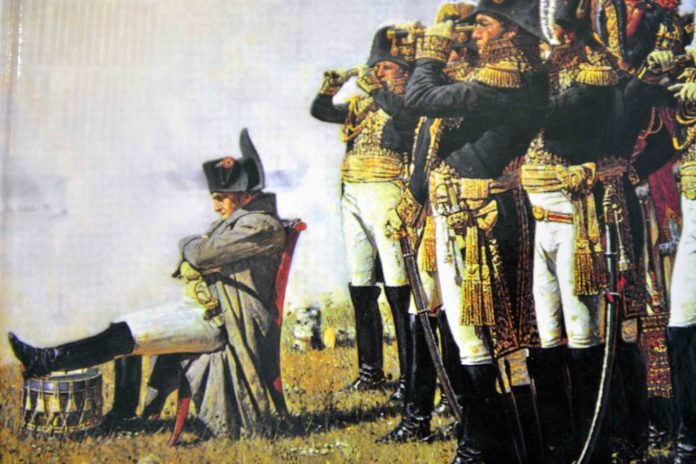You’ll have to excuse me for choosing the wrong title for this article. The government shutdown against Nancy Pelosi was not really Trump’s Waterloo so much as his Gettysburg, but whereas Gettysburg is generally looked at as a Northern victory, Trump’s loss to Nancy Pelosi may have been the decisive defeat of his Presidency.
In fairness to Waterloo, I know the history of Gettysburg far better. If I knew more of the details of Waterloo, I might be able to use it as an analogy of what just happened to the Trump Presidency, but suffice it to say that I used Waterloo in the title for two important reasons: 1) it is universally recognized as a decisive defeat, and 2) though Gettysburg is a great military example, the politics surrounding Gettysburg are wrong. I ask for your indulgence in using Gettysburg as my example, and I think by the end of the article you’ll agree that using Waterloo in the title, and Gettysburg in the article, was the right thing to do.

What many people don’t know about Gettysburg is that Confederate General Robert E. Lee had a number of opportunities to win. On day one, the Confederates entered the battle with two Infantry divisions against Union General John Buford’s two cavalry brigades. Buford dismounted his cavalry, and though outgunned, outnumbered, and outclassed, was able to hold off the Confederates long enough for Union infantry to arrive – but had the Confederates made an all-out push against Buford, Buford could not have stopped them, and the Confederates, rather than the Union Army, would have controlled the high ground around Gettysburg, making it a very different battle, and one the Confederates probably would have won.
Late on day one, and throughout day two, the Confederates had several opportunities to turn one, or both, Union flanks. Again, however, the Confederates failed to take advantage of those opportunities, and the Union flanks remained intact.
After day two, Confederate General James Longstreet urged General Lee to redeploy the Confederate Army, somewhere between the Union Army and Washington D.C., forcing the Union Army to attack Lee on ground of Lee’s own choosing. This was probably the best opportunity Lee had to achieve a decisive victory, but Lee decided to attack the Union middle instead, leading to Pickett’s Charge, and a decisive Confederate defeat.
Let’s compare this very brief overview of Gettysburg to the recent government shutdown. Trump, in our example, is in the position of Robert E. Lee, and Nancy Pelosi is in the position of Union Commander General George Meade.
At the onset of battle, Trump met with Pelosi and Chuck Schumer in the Oval Office. Chuck Schumer dared Trump to take credit for the impending government shutdown, and Trump did so.
Trump did not have to take credit for the shutdown. He could have said, “Now Chuck, I’m only asking for $5.7 billion for about 200 miles of wall – a fraction of what you yourself have authorized in the past. If this shutdown happens, it’s because you and Nancy are being completely unreasonable. The American people by and large want better border security, and more walls along the border, where walls are beneficial, is a necessary component of that. Let us put our differences aside and work together to get this job done. It’s not a lot of money in the overall scheme of things so please don’t shut down the government when everyone can see you are doing so as a purely symbolic gesture.” Had Trump said that, or something like that, he would have effectively pushed the Democrats back, and Trump could have occupied the moral high ground. Instead, Trump took credit for the shutdown, and gave the moral high ground to the Democrats.
On Day Two, Trump attacked the Democrat’s flanks, talking about building the wall as a ‘national emergency,’ and also fighting with Nancy Pelosi over the State of the Union speech. The fight over the State of the Union speech could have made this the most highly anticipated, and most watched, State of the Union speech in our nation’s history, and Trump could have used the speech to mount a full offensive against the Democrat’s flank – an offensive they could not have weathered. Instead, air traffic was slowing to a crawl, threatening a recession, and Trump blinked. Day Two was lost.
It is now the evening of Day Two, and all eyes are looking ahead to see what will unfold on Day Three of the battle. The smart money is that whatever Trump does will end up looking like Pickett’s Charge, and fail miserably. He’s already shown Nancy Pelosi two things: 1) the media will blame Trump for any harm caused by an inability to negotiate, and 2) if something threatens recession, Trump will blink. Just as the Confederate Army was ill-equipped to mount a frontal attack against Meade on Day Three of Gettysburg, so too Donald Trump is ill-equipped to mount a frontal attack against Nancy Pelosi by allowing another government shutdown in three weeks.
Nor can Trump build the wall without Congress. Even if Trump could raise $5.7 billion by calling the border a national emergency, building the wall without congressional authority would write the Democrat slogan for 2020: “Mr. Gorbachev – TEAR DOWN THIS WALL.” Such a thing would give the Democrats a victory in 2020, and they’d likely not only tear down the parts of the wall Trump built, but the more than 300 miles our country built before Trump’s Presidency, as well.
For Trump to win a decisive victory, he has to take Longstreet’s advice, and redeploy between the Union Army, and Washington D.C., forcing Nancy Pelosi to attack him on ground of his own choosing.
Polls show that Trump is doing better with minorities than any Republican since Eisenhower, and though Trump does have to eventually build more border walls to win reelection, he does not have to do so right now. He should pivot temporarily away from the wall, and attack the Democrats where they think they are strong, using Dinish D’Souza’s research to show the racist history (and current racist positions) of the Democrat Party.
Trump should make the right of People of Color to be conservatives, without being ridiculed (or called ‘race traitors’), the central pillar of his next two years. Trump should use prominent conservative minority voices to attack the Democrats, calling them out, not only for the racist positions the Democrat Party has taken in the past (the Democrat Party was literally found to defend slavery), but also for the racism of low expectations Democrats consistently show today, and for the constant attacks against conservative minority voices.
Once Trump puts the Democrats on the defensive, he can pivot back to the border, by pointing out that Democrat calls against border security are really just more examples of the Democrat’s low expectations toward minorites. When Democrats argue that any stance against illegal immigration is racist, they are also arguing that all Hispanic Americans are illegal immigrants. Trump should call them out on that. Trump can then offer a compromise that includes walls where appropriate on the border, along with a permanent solution for DREAMers, and a much more transparent immigration policy, that makes it easier for people from all over the world (including south of our border) to immigrate legally. If the Democrat Party wants to die on their sword, standing against legal immigration, let them…
Had Lee pivoted away from Gettysburg after Day Two, and positioned himself between the Union Army, and Washington D.C., the Union Army would have been forced to attack. It is obviously a good thing for posterity that Lee decided to attack the Union middle, instead, but Lee did have an opportunity, and Lee squandered it.
Trump is not Lee, but like Lee, he has become a divisive symbol of racism, and if he continues to fight the current battle, he will lose. There was nothing Lee could do about being a symbol of racism, as even though Robert E. Lee was personally against slavery, he was nonetheless fighting to protect it. Trump may have a big mouth, and he may often open it without thinking, but he is not a racist, and is in a much better position in that regard, than Robert E. Lee. Trump can pivot away, and force a different, decisive battle, that Nancy Pelosi would lose.
This article is going to get attacked for equating Donald Trump with the Confederacy. “How fitting,” many on the left will say. But note that I actually used Waterloo, and not Gettysburg, in the title, and that I am using Gettysburg as purely a military example that has nothing to do with the politics of the Civil War. Here too the Democrat position is weak: Robert E. Lee was a Democrat, as were all of the Confederate Generals. Jefferson Davis (the Confederate President) was a Democrat in the United States Senate before the war. All of the Confederate leaders were members of the Democrat Party, and though Democrat racism has changed a great deal since the end of the Civil War, it is still very much present. The Democrats are very weak on this issue, and Trump has an opportunity to turn a tactical defeat into a strategic victory.
What Trump will do, only time will tell…

























I know a thing or two about Waterloo. Napoleon was very sick the before and during the battle and his incompetent generals organized the details of the battle plans whereas Napoleon would normally be on the battlefield directing every activity. While the French outnumbered the British and Prussian armies, major tactical errors led to Napoleon’s defeat. Even still, the French could have won the day had the battle at the farmhouse went their way and the French cavalry didn’t try to charge the British infantry without support from their own infantry and canons. The battle was considered over when the elite French Imperial Guard was committed to battle (they were typically never used) and failed to break the British lines.